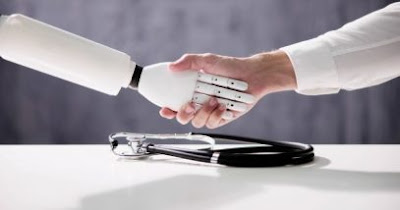5 Ways Artificial Intelligence Is Changing Healthcare
Imagine you’re at the helm of a spaceship, cruising through the universe of healthcare. Out of nowhere, a meteor shower of technology—Artificial Intelligence, to be precise—is fast approaching. This AI stuff, it’s zipping around, altering the course of everything we’ve ever known about healthcare. Feeling a bit edgy? You’re not alone. Many of us are strapped in, watching as these AI meteors streak across our healthcare skies, wondering: where are we headed?
But here’s the thing: It’s perfectly okay to feel a touch of nerves. Change can be intimidating, and this AI revolution? It’s like nothing we’ve ever seen before. Imagine ten different ways AI is revamping our healthcare universe, from predicting health trajectories to managing occupational stress. It’s mind-boggling, right?
But guess what? This journey can also be thrilling. It’s like unwrapping a present and finding a tool that just might reshape our world for the better. So buckle up because we’re about to uncover the ten ways Artificial Intelligence is transforming healthcare. Ready to navigate this brave new world together? Let’s dive right in!
5. Diagnosis Made Easy
Have you ever wondered how doctors unfurl the mysteries of diseases? Lately, a friend named Artificial Intelligence (AI) has been their new aid. AI is revolutionizing the way diseases are diagnosed and treatments are suggested.
Imagine you have an unusual rash. Instead of making your way to a clinic and waiting your turn, you just click a photo and upload it on an AI-powered application. Within seconds, you get a probable diagnosis and treatment suggestion.
AI’s proficiency lies in processing an abundance of medical data and identifying patterns or connections that might elude even seasoned medical professionals. AI doesn’t limit itself to common ailments; it aids in the early detection of intricate conditions like cancer and heart disease, often before symptoms manifest.
AI’s role extends beyond diagnosing to suggesting optimal treatment options. It works like an intelligent medical textbook, continuously updating itself with the latest research, guidelines, and individual patient histories.
While this might sound like a sci-fi plot, this is the reality of present-day healthcare. AI is transforming healthcare to be quicker, more accurate, and highly personalized. However, it’s important to remember AI supports doctors; it doesn’t supersede them. The human touch remains paramount in patient care.
4. Next-Level Medical Imagining
Remember the thrill of playing “I Spy” as a youngster, straining to detect hidden items within a cluttered image? Medical imaging echoes this activity, except our quest is to unearth clues about your body’s internal workings. With AI in our toolkit, it’s akin to wielding an ultra-powered magnifying glass!
Traditional imaging techniques are undoubtedly effective, but occasionally, they might overlook minute details. This is where AI becomes an invaluable ally, capable of identifying the smallest irregularities in an instant. You might wonder, “Could a machine truly rival the precision of the human eye?” An excellent inquiry!
Here’s the unexpected revelation: AI doesn’t merely match human performance—it frequently surpasses it!
Picture the perplexing “Where’s Waldo” conundrums. AI can pinpoint Waldo, identify his lost shoe, and even discern an ant bearing a leaf three pages prior. In healthcare, this equates to detecting potential issues well before they escalate.
With this advanced medical imaging, we’re not simply engaged in playful games. We’re on a mission to defeat diseases, one scan at a time. To me, that’s truly revolutionary! So, are you prepared for a glimpse into the future of healthcare? Because, my friends, it’s shaping up to be extraordinarily promising!
3. Personalized Treatment
Remember the childhood game “Telephone,” where the message morphs and distorts as it gets passed along? Imagine experiencing that with your prescription instructions—not ideal, is it? That’s where AI enters the scene, functioning as a super-assistant to enhance patient engagement and adherence to medication.
Picture this: You’re prescribed a new medicine, and remembering the schedule is a bit of a challenge. Suddenly, a buzz from an AI-powered app on your smartphone nudges you—it’s time to take your medication. It’s as if you have a supportive friend right in your pocket, prodding you to maintain your regimen.
Here’s the intriguing part. AI isn’t merely a tool for setting reminders. It has the capacity to learn about you, understand why you might be missing doses, and provide advice to help keep you on course. Forget to take your morning pill due to your night owl tendencies? The app might propose transitioning to an evening dosage instead.
This might seem straightforward, but the potential ramifications are immense. By improving medication adherence, we’re promoting better health outcomes, fewer hospital admissions, and an optimized healthcare system.
What’s more, it’s not just about pills and medicines. AI can encourage individuals to adopt healthier dietary habits, increase physical activity, and manage chronic ailments more effectively. It’s akin to having a personal cheerleader in your pocket, promoting healthier routines, and applauding your progress.
So when your phone buzzes with an AI reminder, bear in mind that it’s more than a simple alert. It’s a sophisticated digital ally, determined to guide you on your journey to improved health. Who would have thought adhering to your medication schedule could become this stimulating?
2. Accelerating Drug Discovery
The journey to unearth a new drug can resemble an arduous search for a tiny needle hidden within a mammoth-sized haystack. However, AI acts as a powerful catalyst in this process, identifying the appropriate drug swiftly and forecasting imminent advancements using historical data.
Picture AI as a navigational instrument guiding us directly to the coveted prize, significantly reducing wasted time and steering us toward the precise remedy. This transformation is not just a game-changer but, indeed, is a life-altering revolution
1. Virtual Health Assistance
Picture this: You’re feeling crummy, but your doctor’s office is closed. What’s a person to do? Enter Virtual Health Assistants (VHAs), your anytime, anywhere buddies. These smart helpers are like mini doctors living in your phone, ready to lend a hand when you feel under the weather.
Now, you might be wondering, “But how can an AI know what’s wrong with me?” Well, it’s simpler than you think. Just like how your dog knows it’s walk time when you grab the leash, these VHAs pick up on patterns. They can piece together symptoms and medical history like a jigsaw puzzle, revealing the complete picture of your health.
Sounds too good to be true? Here’s an example: Let’s say you’re up at 3 am with a fever and a scratchy throat. Instead of panicking, you turn to your VHA. It asks you a few questions, kind of like a virtual chat with a doc. In minutes, it suggests you may have strep throat and advises rest and plenty of fluids. It might even help schedule an appointment with your doctor first thing in the morning. How cool is that?
But here’s the crazy part. These VHAs learn. With every interaction, they get smarter, like a virtual medical detective growing sharper with every case. So, in the future, they might even catch things before you notice the symptoms.
It’s like having a superhero sidekick in your pocket, ever vigilant, ready to keep you on track. Who’d have thought our phones could turn into our own personal health allies?



